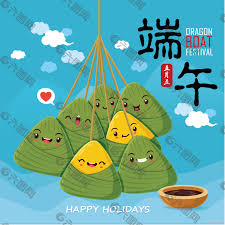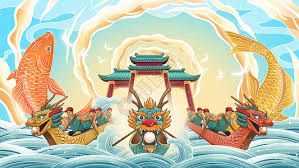Dear friends,
This time I will introduce you to a legendary traditional Chinese festival – Dragon Boat Festival
It is not only an important symbol of Chinese culture, but also a sensory feast across time and space, integrating history, competition, food and natural wisdom. Let us unveil its mystery together!
1. Basic information of the festival
Time: The fifth day of the fifth lunar month every year (late May to late June of the Gregorian calendar).
Other names: Dragon Boat Festival, Double Fifth Festival, May Festival.
Core spirit: Commemorate historical figures, drive away evil spirits and avoid epidemics, and welcome midsummer.
2. Origin: The interweaving of history and legend
There are many different opinions about the origin of the Dragon Boat Festival, and the most widely circulated version is related to Qu Yuan
Who is Qu Yuan?
He was a patriotic poet and politician in the Warring States Period (about 340 BC). He committed suicide by jumping into the river out of grief and anger over the fall of his country.
Mourning of the people:
People rowed boats to salvage his body and threw rice balls into the river to prevent fish and shrimp from eating it, which gradually evolved into the custom of dragon boat racing and eating zongzi.
Other origin theories:
Nature worship: The ancients believed that May was a “poisonous month” and the fifth day was an “evil day”, which required exorcism and poison avoidance.
Commemorating Wu Zixu or Cao E: Some regions commemorate other historical figures.
3.five iconic customs
I.Dragon Boat Race
The scene is grand: painted dragon boats cut through the waves, drummers beat the rhythm, oarsmen roared, and the audience cheered.
International influence: Dragon boat races are held in more than 80 countries around the world, becoming a bridge for the integration of Chinese and Western cultures.
II. Zongzi
What is it?
Glutinous rice is wrapped in bamboo leaves, filled with meat, bean paste or egg yolk, and steamed to be fragrant and soft.
North-South differences: The north prefers sweet zongzi (red dates, bean paste), while the south is keen on salty zongzi (pork belly, salted egg yolk).
III. Hanging mugwort and calamus
Scientific wisdom: The ancients used mugwort to repel insects and calamus to kill bacteria, which meets the needs of summer disease prevention.
Modern inheritance: Many families still retain this custom to add the fragrance of plants to the festival.
IV. Wear sachets and five-color threads
Sachets: Containing herbs, implying exorcism and blessing, and are also exquisite handicrafts.
Five-color silk threads: Symbolize the balance of the five elements, tied to children’s wrists to pray for health.
V. Realgar wine
Traditional ritual: Drink a small amount or apply it on the forehead. It was used to repel snakes and insects in the old days (note: it contains arsenic, and is mostly used symbolically in modern times).
4. Why does it belong to all mankind?
UNESCO certification: It was selected as an intangible cultural heritage of humanity in 2009, recognizing its universal cultural value.
Resonance of nature and humanity: The Dragon Boat Festival customs echo the common theme of the world – commemorating heroes, respecting nature, and protecting health.
Modern innovation: From chocolate rice dumplings to the Metaverse Dragon Boat Race, ancient traditions are attracting the younger generation in new forms.
5. How to experience the Dragon Boat Festival?
Make your own rice dumplings: search for simple recipes and try making them with palm leaves or banana leaves!
Watch dragon boat races: many international cities hold events, such as Sydney, San Francisco, London, etc.
DIY sachets: sew your own sachets with dried flowers and herbs, and give them to relatives and friends to convey blessings.
Conclusion
The Dragon Boat Festival is not only an echo of history, but also a living culture. It tells us that the vitality of a festival lies in people’s love for nature, respect for their ancestors, and the eternal pursuit of a better life.
Welcome to join this celebration that spans thousands of years – whether you are tasting a rice dumpling or cheering for the dragon boat race, you are sharing the same cultural heartbeat with hundreds of millions of Chinese.
Finally, I wish you all a happy Dragon Boat Festival!


